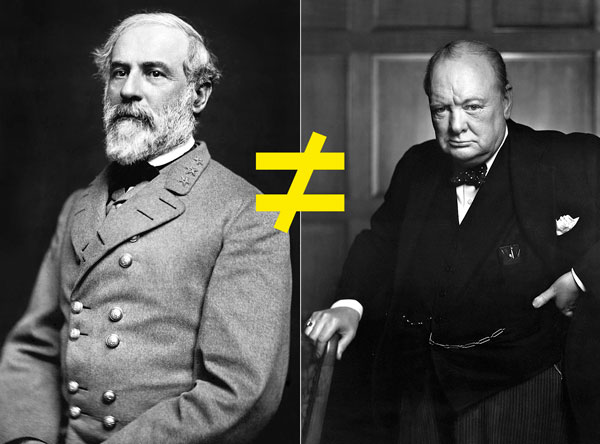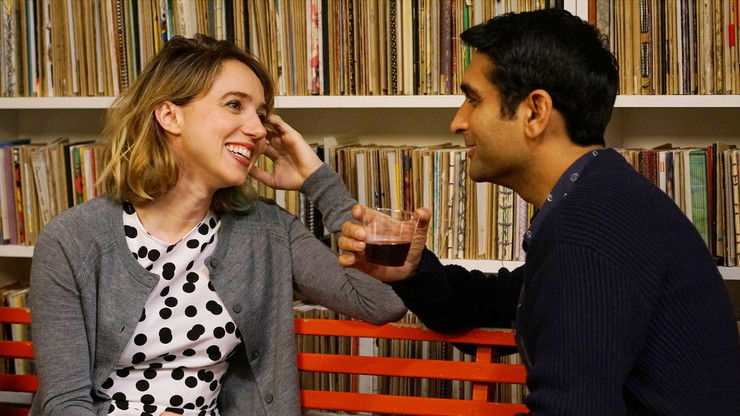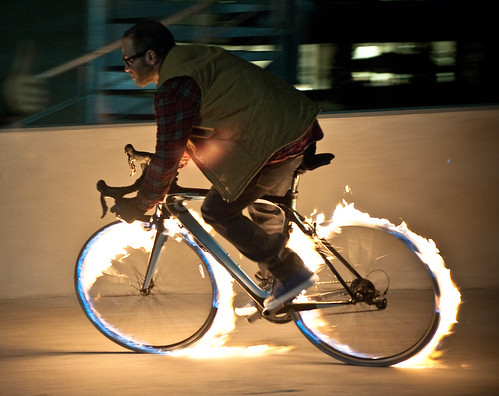Time Will Tell
 One thing is not like the other thing.
One thing is not like the other thing.
“ Only time will tell, then we can rewrite that story too.”
Seeing a bust of
Sir Winston Churchill anywhere in Canada is surprisingly common. Recently, it came up in conversation that the current desire to remove monuments to Confederate heroes is a version of rewriting history and seeing historical persons in a contemporary light fails to recognize that. Would there ever be a time Churchill would be viewed as a war criminal and have public statues of the British war time prime minister removed? Well… that isn't really the same thing is it? If there was a glass of milk on the table when we left the room and we returned to find it empty, who's to say it was consumed by a thirsty thief or returned to its carton by a do-gooder? The result only appears similar but what happened was entirely different. In truth,
we rewrite history all of the time when new evidence is discovered that offers an alternative viewpoint or if a different context provides a clearer picture. Yet, the removal of monuments commemorating Confederate military leaders from southern US cities, particularly those monuments erected in the 20th century funded by
the United Daughters of the Confederacy, isn't a rewrite, it's a correction. Those monuments themselves represent a rewriting of history intended to argue that the Civil War wasn't about slavery as much as it was about the rights of states (commonly know as the
The Lost Cause movement) and to believe that interpretation is to accept the revisionist story as truth. This video makes that argument:
It's also a bit of a non-starter to equate Churchill's legacy with that of say
Robert E. Lee, much as it was a false equivalency to compare Thomas Jefferson or George Washington with Lee et al. Of course in Canada, the recent renaming of the Langevin Block on Parliament Hill due to the namesake's role in the residential school system that caused so much pain to indigenous Canadians is another example of what some might think of revisionist history. I would say in this case the intention wasn't so much to rewrite history but to learn from it, and, by the way, maybe not commemorate someone whose very mention is an insult. I don't even really know Hector Langevin's part in the residential school system but taking his name off of a government building doesn't remove him from the history books but recognizes a reasonable diminishment of reverence.
It is interesting that this summer's acclaimed picture
Dunkirk about a much revered moment regarded proudly by the British despite it being a tale of defeat, has been criticized for accuracy and will be followed by another British WWII themed bio-pic of
Churchill. I suppose we accept the editing of historical fact for entertainment because we understand the desire for brevity or the elements that make for a better story are sometimes less complex than the reality of what happened. It's curious that World War II themed films of how the British overcame their "darkest hour" would be released in a cluster like that. It makes me wonder if on the heels of Brexit there was a swelling of British pride and a desire to pursue those kind of stories. Only time will tell, then we can rewrite that story too.
Update Friday, August 25, 2017. Okay Okay Okay - I have to admit I did not foresee the whole "Ban John A. Macdonald's Name" from schools thing when I wrote this. Yet I would say, who cares about dropping Hector Langevin's name? But our first Prime Minister? Well, I guess my first reaction would be the name is too pervasive and his role as founding father and first Prime Minister is too great to just banish his name or image. I would also say there's no reason to not at least have a long hard think about who we commemorate when we name buildings etc. There's actually no reason you can't accept John A. Macdonald as both an important historic figure who was also a first-class prick. Many important men in history were. The problem with the whole statuary and naming thing is it's very close to hagiography which is generally a prickly thing to do in a secular society. Especially when so many historical figures were kinda dicks by modern standards. Typically, Liberals like to point out Macdonald's flaws while Conservatives like to remind you how weird William Lyon Mackenzie King was. Canadian Conservatives would love to get rid of any references to Lester Pearson even though the guy won a Noble Peace Prize and was in power when we adopted our flag. Ain't no flies on Mike Pearson, surely? Or Tommy Douglas? Again, Conservatives bristle at a lefty getting kudos. The only wholly accepted personage I can think of who no one would argue about would have to be Terry Fox. Let the names and statues be, especially if the duality of the honouree has changed with hindsight. The nature of the Southern memorials was that their presence was insulting to a particular part of society from the moment they were erected rather than from a place of retrospection. It would be pretty hard to remove Macdonald's name and likeness from every building. I mean, the guy is on the ten dollar bill and is still a less racist Scot than Sandy McTire (if I were Scottish that guy would be my version of the Cleveland Indians' Chief Wahoo). Likewise, it would be easy to have an old white guy on a currency and know that this man, despite being a heavy drinker actually got a bunch of other white dudes to agree to something pretty great. By the way, he was also the kind of guy who would try to starve a part of the population and exploit a tiny uprising and hang a rebel to prove his ideas were right. Louis Riel himself is highly thought of in the west but was he entirely sane? I mean, let's not even start about Mackenzie King who had some serious mommy issues for talking to his dead mom, stuffing a beloved pet and as a "lifetime bachelor" may have been Canada's first gay Prime Minister (hey, just saying… he wasn't exactly a lady's man. Unless you count the dead lady he held seances to talk to). All I'm saying is don't let someone else's extreme position take away from reasoned argument and debate.Labels: politik








